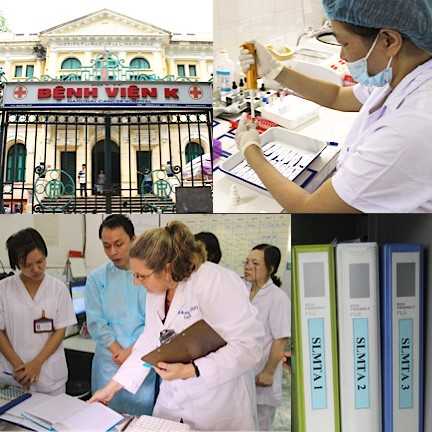CDC helps strengthen Vietnam’s national laboratory system

After 12 months of training and mentoring, Anna Murphy, Technical Consultant from the American Society for Clinical Pathology, conducts the SLMTA exit assessment of the laboratory at the National Cancer Hospital in Hanoi, Vietnam.
Among the basic building blocks of a strong and sustainable national health system are a high quality laboratory system and a trained local workforce, critical components of the CDC mission in Vietnam. To lay this foundation, the CDC Vietnam laboratory team has been working diligently for over four years with the Vietnam Ministry of Health (MOH) providing technical expertise to develop policies that will increase the capacity and quality of Vietnam’s entire national network of laboratories. With funding support from the President’s Emergency Plan for AIDS Relief (PEPFAR), this collaboration has been very fruitful, culminating in the development of several new circulars, national strategic plans, and the completion of a management training program that will have an unequivocal impact on public health in Vietnam.
One of the most recent achievements was in May 2013, when the first and most comprehensive circular of its kind was approved in Vietnam. This new circular will enhance quality assurance for HIV testing laboratories in Vietnam by establishing standard requirements for the infrastructure, personnel, equipment, and management of laboratories. This policy also establishes standard procedures for laboratories to apply to be an HIV screening laboratory, to be certified as an HIV confirmatory laboratory, to be assigned as a national reference HIV testing laboratory, and for suspension of certification when laboratories are out of compliance.
The CDC Vietnam laboratory team also reached several other major milestones as part of a long-term plan to lay a strong foundation for Vietnam to build a high quality and sustainable national laboratory system. These accomplishments include a circular that improves the laboratory quality management system, develops a national laboratory strategic plan for 2017 to 2030, and establishes guidelines to regulate CD4 testing and viral load testing in laboratories.
For the first time, Vietnam joined the global “Strengthening Laboratory Management Toward Accreditation” (SLMTA) program movement, which has already proven effective in 36 countries around the world. This summer, CDC Vietnam provided technical expertise to the Vietnam Ministry of Health to successfully complete the first year of the SLMTA program. The Vietnam SLMTA program was launched in May 2012 and is the second country in Southeast Asia to implement SLMTA. Currently, there are only a handful of laboratories in Vietnam accredited to an international standard. However, twelve laboratories are now better prepared to attain accreditation after successfully completing the rigorous and interactive 1-year management training program, with step-by-step hands-on training activities and regular on-site mentoring. These twelve include labs from hospital settings (national, provincial and district), public health facilities and HIV confirmatory diagnostic sites.
The SLMTA program showed such significant improvement in laboratory performance that CDC plans to work with the Vietnam Ministry of Health to rapidly scale-up the program nationally, and hence, strengthen the national laboratory system in Vietnam. After a year of training, each of the twelve laboratories showed on average, 25% improvement in compliance with all 12 standard laboratory evaluation areas. The most notable improvements (over 50%) were in establishing better quality documentation and record-keeping, an internal auditing system, and client and process management.
Vietnam’s contribution to SLMTA was the creation of an electronic assessment tool which allows for faster calculation of site scores and more rapid presentation of results to laboratory staff and management. This new tool is currently in use in Cambodia and is likely to be adopted by SLMTA programs in other countries.
“This is the first time we have ever received on-site mentoring and training together. Thanks to the SLMTA program, we now have more knowledge and technical skills and can apply the quality management system approach in our daily work, “ said Dr. Phuong Anh, lab manager at the National Cancer Hospital in Hanoi, Vietnam.
Together, the CDC Vietnam laboratory team and the Vietnam Ministry of Health has laid a strong foundation for a high quality laboratory system and a sound local workforce that can provide more timely and high quality testing results that will have an immeasurable public health and clinical care impact in Vietnam for many years to come.
After 12 months of training and mentoring, Anna Murphy, Technical Consultant from the American Society for Clinical Pathology, conducts the SLMTA exit assessment of the laboratory at the National Cancer Hospital in Hanoi, Vietnam.
- Page last reviewed: March 31, 2016
- Page last updated: March 31, 2016
- Content source:
Global Health
Notice: Linking to a non-federal site does not constitute an endorsement by HHS, CDC or any of its employees of the sponsors or the information and products presented on the site.


 ShareCompartir
ShareCompartir